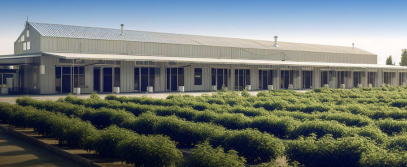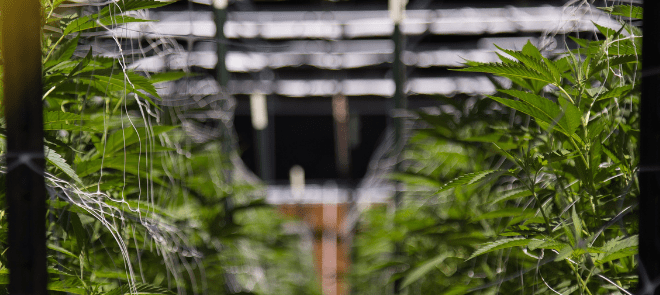Regulatory Compliance and Security Remain Key Challenges for Cannabis Market Participants

On this podcast, John Satter explains the impact of geographic-specific regulatory requirements, zoning regulations, security complexities and a range of other factors on cannabis cultivators, manufacturers, distributors and retailers.
Steve Katz 00:16
Hi, everybody, and thanks for listening in on our Hilco global Smarter Perspective podcast. I’m your host, Steve Katz. And if you’re listening in for the first time, we’re really glad that you are. And if you’re returning, we’re also glad that you tuned in once again. So today we’re going to be having a really interesting discussion. It’s kind of a follow up to a talk that we had with our friend John Satter, who’s Senior Managing Director for the Midwest region of Hilco Real Estate Appraisal. We’re going to be talking about the cannabis market. A lot of things have changed since we talked to John late last year, both in the market itself and in the real estate market. So we are glad to have you back John.
John Satter 01:01
Great, thanks. Glad to be here.
Steve Katz 01:03
Yeah, let’s, let’s just kick it right off by talking about navigating what, what really is a very complex regulatory environment in regard to the cannabis industry. Right now. Can you can you talk a little bit about what some of the most important considerations for the investment community developers and others are when they talk about getting involved with the market specifically related to regulatory issues?
John Satter 01:27
Sure, Steve. I think since we last spoke, the legalization and decriminalization of cannabis for both medical and recreational use has continued to expand across states in the US. In those states, they’ve been a documented increase in demand for commercial properties, including warehouses, storefronts, and land development land. So that’s pretty universal. But what isn’t universal are the nuances associated with a geographic application of regulatory requirements on the industry and its participants based on proximity and cross border competition in certain markets is critical to look at both the US and Canada, and how the legal and regulatory frameworks surrounding cannabis differ and impact business for operators in the two countries impacted states and provinces been thoroughly familiar with local and nearby competitive market regulations. zoning laws and licensing requirements is critical for both real estate developers and investors who ensure compliance and avoid costly and time consuming legal roadblocks. These considerations should also extend to sustainability and environmental impact of cannabis cultivation, for example, requires significant resources, including energy and water, have sustainable practices and energy efficient infrastructure to help reduce the environmental impact of cannabis operations and without question, will continue to be increasingly important to both regulators and communities across the country in the coming years. Also, zoning regulations play a pivotal role in determining where cannabis related businesses can and do operate. These regulations often dictate the proximity of cannabis facilities to schools, residential areas, competitive prop competitive cannabis operators and other sensitive locations. Identifying suitable properties that meet zoning requirements specific to an area targeted for development is essential for successful real estate ventures within the cannabis market, and having a solid grasp of the operating impact of such restrictions, as well as the overall level of demand and saturation for cannabis products and locations being considered for development or investment is essential, as these can have a significant impact, either positive or negative on both the value of real estate, and the potential for return on investment. And lastly, public perception of cannabis. And those who operate cannabis facilities varies. So our team always advises as investors and developers to carefully consider community sentiment when making decisions about looking around or leasing to operators listening to and honestly working with community groups, businesses and individuals can often defuse and sufficiently address early concerns, while also building trust and open lines of communication that will be important in the future.
Steve Katz 04:40
Yeah, that last point is is really interesting because I mean, it’s it’s logical and there’s going to be some resistance to particularly by people who live in the areas in which some of these businesses are looking to, to locate if for no, no other reason that they just really don’t understand it. So I think that’s a that’s a great point. Let’s talk a little bit about the The types of properties and facilities that comprise the industry. And you know, the various considerations that come along with each of those that quite frankly, many first time entrants in the market probably are not aware of, but could create stumbling blocks for them on the path to success.
John Satter 05:17
That’s a valid point, Steve. The industry functions thanks to work performed at and across numerous types of properties. And these include those that house cultivation facilities, processing centers, distribution hubs, research laboratories, and of course, at the retail level the dispensaries. Each of these different property types come with unique infrastructure, security needs and other requirements. Each also present opportunities for different types of investment, and development. So while dispensaries may sit on a sliver of an acre in a metro area, cultivation sites often occupy acres of land in rural regions. And while this diversity of entry points creates a great expanse of opportunity, it also necessitates that investors carefully tailor their strategies and funding to properly suit the specific needs associated with starting up and running the type of cannabis business they aim to support. And then our security which is an absolute top priority for the cannabis industry, due to the nature of the product, and the potential risks associated with it. To comply with regulations and safeguard their supply chain, operators need to meet stringent security standards, including video surveillance, access control systems, and alarm systems, capital and operating costs associated with meeting these requirements and protect them the valuable assets, including but extending beyond finished and unfinished inventory, have often been underestimated during the early years of cannabis expansion in both the US and Canada, theft of and damage to cultivation equipment, laboratory instrumentation and production equipment, and create cluttery setbacks for businesses with multimillion dollar investments on the line. Real Estate size selection, including through due diligence, which our real estate team at Hilco specializes in, among other things, is critical in assessing historic crime and other important trends associated with locations under consideration that can serve to significantly limit downside risk.
Steve Katz 07:32
Yeah, obviously there there are a number of considerations, including those types of security risks. What about the financial landscape? I mean, we wouldn’t really have a complete discussion today, if we didn’t talk about how a lack of federal legislation to legalize cannabis has created really an incredible number of challenges for operators or those who have been looking to get into the space since the even the first states came online. What kind of progress has been made, on that front?
John Satter 08:05
Yeah, that’s been an ongoing struggle for a lot of operators. And I think, you know, speaking with operators and and lenders, this really the the state of the industry, this past year has been one more fatigue, as companies kind of cash burn through their their cash available to kind of survive during this high interest rate market that we’re in. So primary. Among the challenges facing these industries is the inability to access traditional financing due to continued federal restrictions in the US, which to some degree are still the result of the lingering stigma associated with cannabis. While state charter banks will lend against cannabis real estate right now at more reasonable rates. They tend to have limited bandwidth and have stringent underwriting with a focus on the business operations as well as strength of the of the sponsor. In the real estate itself, of the financing that we’re seeing now state banks are at prime plus one. And private debt deals are being done around 16%. So not surprisingly, with traditional bank sources limited and transaction vet channels highly, highly limited. Those entering or expanding across the industry are for the most part trying to alternative funding sources, including private equity, venture capital, and specialized cannabis focused REITs to secure financing for the projects. In each of these instances, timely and accurate real estate appraisals are essential to the process. Other considerations to watch out for. For businesses and their lenders based on current laws and requirements include, but by no means are limited to the following because the cannabis industry remains illegal under federal Law, and banks must comply with federal regulate regulations. Any party involved in industry that seeks to secure a lease property with an existing loan on it. Particularly from a large, larger bank, a national bank is likely to encounter complications when it’s happy to do so. And although cannabis is legalized in several states, the fact that it remains illegal under federal law means that transported across state lines can result in federal criminal prosecutions. And this presents a substantial challenge for cannabis businesses operating operating in multiple states. They’re seeking to scale and due to the fact that Federal law prohibits the sale, as well as possession and use of cannabis and all its forms. The major payment networks do not allow cannabis purchases using credit cards. And this adds complexity for consumers and has limited sales.
Steve Katz 10:54
Yeah interesting. Once again, it’s kind of that continuing stigma, it seems it seems like it’s only a matter of time until there is a federal law that enables all of this, but the question is when right, so that’s that’s the reason waiting to read the magic question. All right, John, well great info as always, anything else that we didn’t touch on that you want to share with the audience?
John Satter 11:22
Yeah, sure, Steve. I just like to add that those currently are seeking an imposition to lease their property to cannabis operators. Establishing strong tenant relationships is imperative. And ensuring the success of these relationships starts right at the beginning with comprehensive lease agreements that don’t leave any room for misinterpretation or dispute and a thorough understanding of the leasing businesses specific needs. Identifying and vetting qualified leasing candidates is also essential to ensuring successful leasing outcomes and engagement of an experienced and proven real estate partner that’s well versed in the cannabis industry and contribute to successful lease outcomes, long lasting mutual, beneficial lessor lessee partnerships, and profitable exit strategies.
Steve Katz 12:15
All right. Well, thanks again, John, for joining us to share all those really timely insights. We’ll, we’ll look to get together with you again, certainly within the coming year and check in and see what further developments there have been maybe it will be a little little closer to that federal legislation that everybody seems to be looking for. And if any listeners want to reach out to you what’s what’s the best contact info?
John Satter 12:40
You reach, either by email or phone email is JSatter, and that’s J S A T T E R, at Hilcoglobal.com. And the phone number is 847-504-2472.
Steve Katz 12:59
All right, perfect. Thanks again, John and listeners if your business or business in your portfolio is looking to sell or acquire real estate associated with the cannabis industry, sell or aquire specialized equipment utilized within the industry, or invest in those businesses touching base with John is probably a great first step. I know his focus is on the real estate market itself and real estate aspects, including those lease negotiations. But he can connect you with others across difficult platform of companies, with people who specialize in areas including industrial asset monetization, disposition, and all sorts of other critical areas for the business. So please keep that in mind. And as always, we hope that this Smarter Perspective podcast provided you with at least one key takeaway that you could put to good use in your business, or share with a colleague or client to help make them that much more successful moving forward. And one final thing please remember that you can always check out more great podcasts and articles featuring timely insights from Hilco experts like John at HilcoGlobal.com forward slash smarter dash perspectives. Until next time for Hilco Global. I’m Steve Katz.




